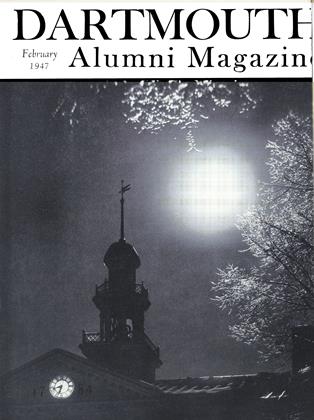ABBOTT JOSEPH LIEBLING '24 (second from left in the above picture taken in a Bowery nightspot) has been described as "that casual New Yorker correspondent, a refreshing personality, a man of gusto and genius, and as a writer whose nose for strange news, ear for queer talk, and sense of odd humor operate to the civilized delight of all his readers." Quite in character is the above picture which Mr. Liebling sent to the editors of the ALUMNI MAGAZINE in response to a request for something informal.
The light touch which has made him a New Yorker favorite has also served to camouflage the man seriously and informedly concerned with national and world developments, especially with democratic and anti-democratic trends and with the free and undistorted flow of information to the people. Under the heading,
"The Wayward Press," Mr. Liebling regularly conducts for The New Yorker a comparative study of the way in which newspapers present the news. A former reporter for The New York Times, Providence Journal and New York World Tele-gram, he started writing for The New Yorker in 1935 and in 1939 was sent abroad by that magazine as war correspondent. He covered France until the armistice was signed, and later based his book, The Road Back to Paris (1944), on those experiences. He then covered England before and after Pearl Harbor and concluded his foreign assignment in North Africa.
In addition to many profiles, reviews and articles for The New Yorker, Mr. Liebling is the author of They All Sang (with E. B. Marks, 1934), Back Where ICame From (1938) and The Telephone Booth Indian (1942). Something of an authority on French mediaeval literature, which he read on the Hanover Inn porch during a 1943 respite from war reporting, he studied at the Sorbonne and the Ecole des Chartres after leaving Dartmouth.
 View Full Issue
View Full Issue
More From This Issue
-
 Class Notes
Class Notes1918
February 1947 By ERNEST H. EARLEY, DONALD L. BARR -
 Article
ArticleThe American Press
February 1947 By CARL D. GROAT '11 -
 Article
ArticleYour Newspaper and You
February 1947 By CLAUDE A. JAGGER '24 -
 Article
ArticleA Free Press?
February 1947 By A. J. LIEBLING '24 -
 Class Notes
Class Notes1943
February 1947 By FRED F. STOCK WELL, WILLIAM T. MAECK -
 Class Notes
Class Notes1928
February 1947 By OSMUN SKINNER, RUPERT C. THOMPSON JR.







